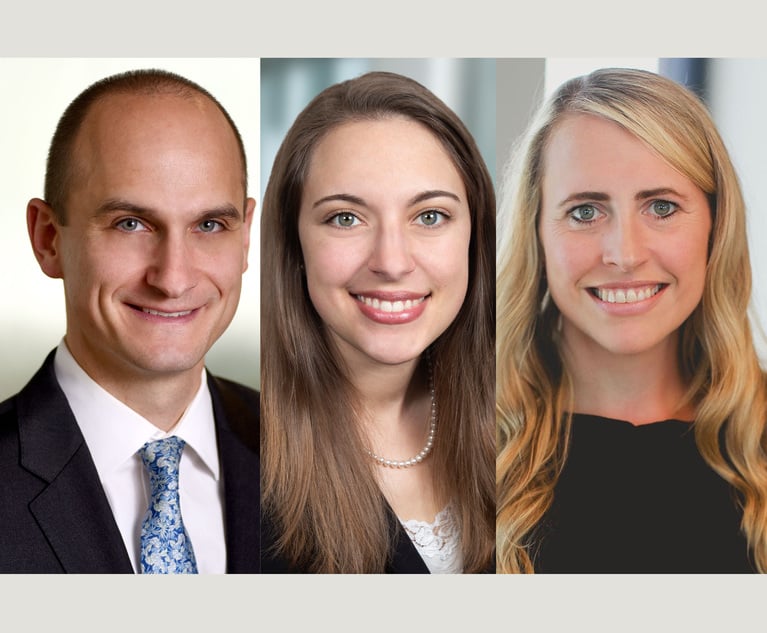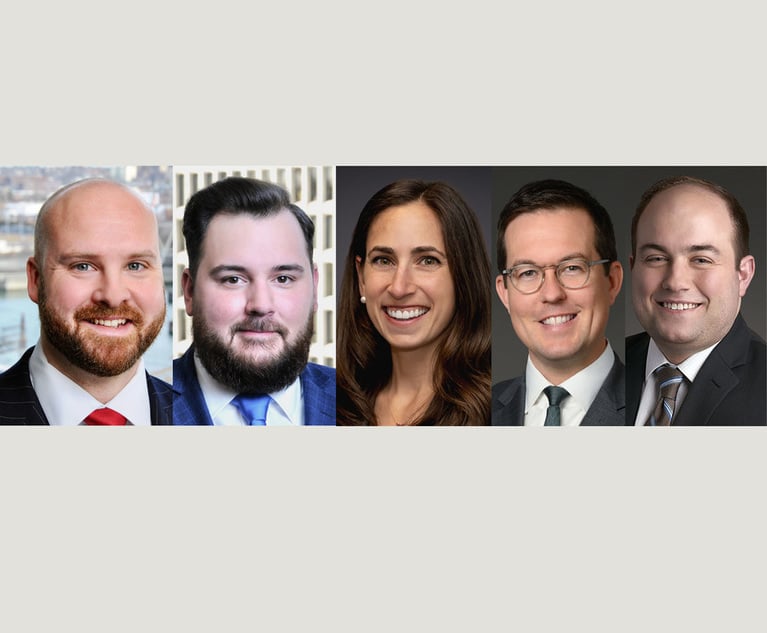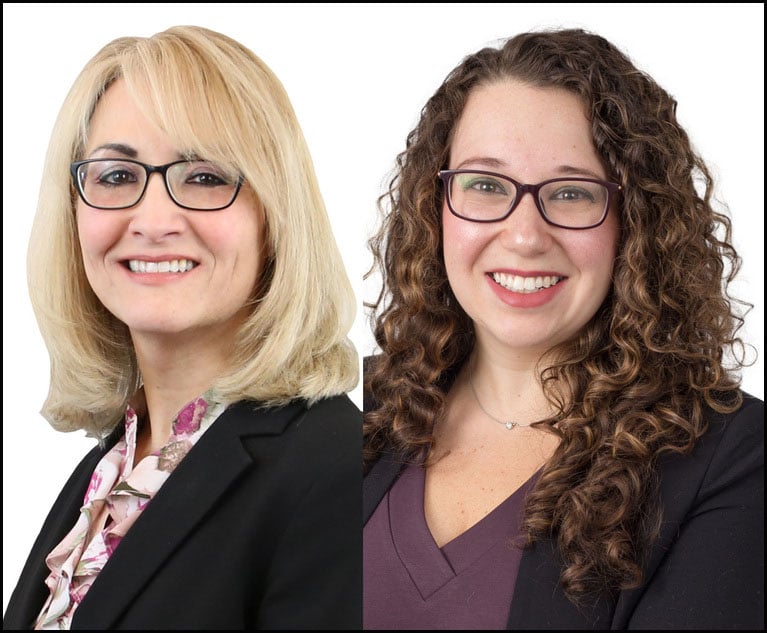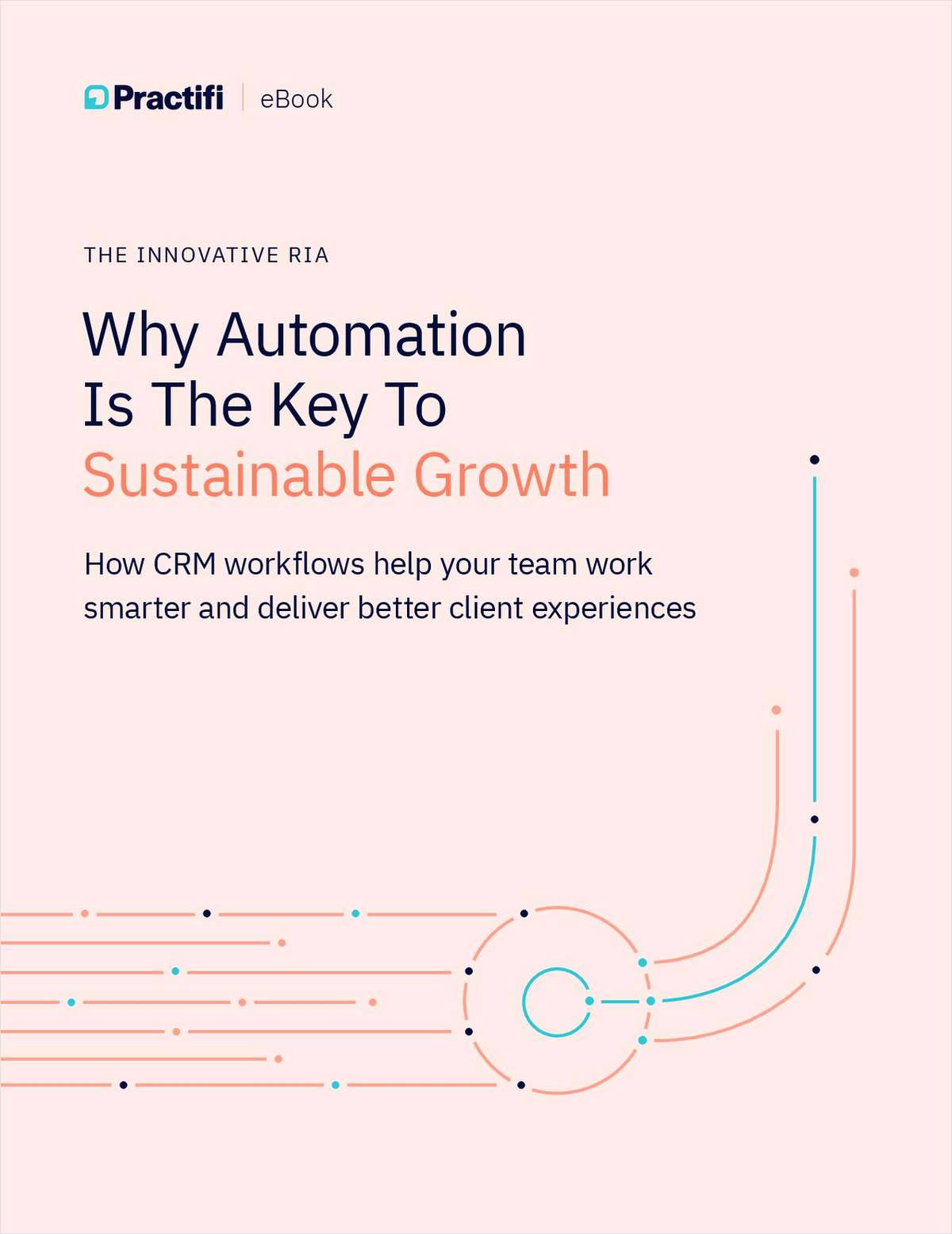 Dan Brody, second from far right, was installed Oct. 16 as the 2019-20 president of the Connecticut Asian Pacific American Bar Association.
Dan Brody, second from far right, was installed Oct. 16 as the 2019-20 president of the Connecticut Asian Pacific American Bar Association.Youngest-Ever President Elected to Conn. Asian Pacific American Bar
Dan Brody said being a big-business defense attorney was not his original dream, though that would have been understandable, considering his background.
November 04, 2019 at 03:59 PM
7 minute read
A key white-collar and government enforcement defense attorney at Robinson & Cole recently became the youngest-ever president of the Connecticut Asian Pacific American Bar Association.
Dan Brody, who recently turned 30, was installed Oct. 16 during CAPABA's annual dinner in New Haven. In a recent interview, he gave a thankful nod to numerous elders and predecessors of the bar who showed great interest and care in helping nurture his career.
Brody said being a big-business defense attorney was not his original dream, though that would have been understandable, considering he is the son of former Senior Assistant State's Attorney Mitchell S. Brody.
"When I was in law school, I was so set on becoming a prosecutor that I excluded many other opportunities and I regret that a bit," said Brody, who now works on the other side of the courtroom, helping white-collar clients with government investigations and crisis situations. "But I was also very naive in terms of what I thought practice would be like. I didn't have a sense of how all these legal areas can merge together and create really interesting cases."
Brody's work ranges from complex business disputes to theft of trade secrets, claims stemming from employee misconduct and business torts. The work includes government enforcement and white-collar defense cases, grand jury subpoenas and enforcement actions.
And the work is "just as interesting," if not more, Brody said, than the state prosecutorial work he first thought he would end up doing. "That's the portion in law school I didn't really understand—the nuance. I thought it was good guys versus bad guys, but oftentimes, private practice is going to offer you the most complex and great variety in these kinds of matters."
Among the cases in which Brody has participated was an offshoot of the investigation into President Donald Trump's former personal attorney Michael Cohen. Brody represented a bank amid a probe of alleged fraudulent activity by Cohen. "It was a very quickly evolving case, and it was always in the news, so it was interesting to read news articles about what was going on." When Cohen's New York apartment was raided by the FBI, Brody recalled "incredibly interesting" work on one piece of the puzzle, which ended with Cohen being sentenced to three years in prison for tax and campaign finance violations.
Growing up in Stonington and the son of an accomplished state prosecutor may sound like a great head start for any young person interested in a career in law, but Brody said there were some identity hurdles along the way. He and his younger sister, Jade, were born in Seoul, South Korea, and adopted into the Brody family, growing up in the shoreline community of Stonington. "I was the only Asian in my school for a number of years," Brody recalled, adding that when Jade started her freshman year in high school, he was a senior, so he became one of two Asians in school for the first time.
While Brody was growing up, CAPABA was in its infancy, having been formed when he was still in middle school. "I had no idea there was this Asian community, and more particularly this Asian lawyer community, that I would eventually become a part of," he said. "Having discovered the group in law school and as a practicing attorney, I was blown away how much support there is, and how enriching it is."
While in law school, Brody interned in the gang and organized crime division of the U.S. Department of Justice and worked in the Appellate Bureau under the chief state's attorney. He said connecting with fellow Asian-American attorneys and other mentors across the state influenced his decision to eventually land at Robinson & Cole. He said joining the firm significantly broadened his perspective.
Brody said Asian Pacific American bar leaders have been exceptionally influential to him and other young members, taking the initiative to stay in contact with them and offer career guidance. "Current and past presidents reached out to me and other young members, and that's something I want to do. It's been such a close-knit group that the professional connections you make can grow into strong friendships. I can't imagine what my career would be without CAPABA," he said.
Brody said his goal as president of the bar will be to continue making these connections, but also to fine-tune them, particularly as the organization has been successful boosting membership in recent years. "I think being president now is a luxury, in that I don't feel like I need to focus on recruitment, and I can focus on engagement and enrichment," he said. "My priority is to set up a new mentoring system where we look at our state in terms of regions. We're a small state, but you have to drive far to get to some places. I want to set up quarterly outreaches for people to mentor or be mentored, and I think that will help my goal of enriching our membership, connecting people and getting people to learn from each other's experiences and share accomplishments. I think everyone can benefit from the collective knowledge of the group."
Along those lines, Brody said Connecticut's most high-profile CAPABA member, state Attorney General William Tong, has been a personal role model. "I can actually see the AG's office from my office window, which is right down the street. For me, sometimes when I'm working a late night I look over there and I get some inspiration and motivation from his achievements," he said.
Brody also credited his own firm with being committed to the development of a diverse workforce. "Diversity is one of the reasons I went to Robinson & Cole. I got a sense from my interviews, networking and seeing the firm show up at CAPABA events, including the annual dinner where I sat at the law firm's table, my take on it is the firm is interested in diversity for all the right reasons. They see the value in it, not just because others in the legal field are doing it, and they have been proactive about it."
Underscoring that commitment, Robinson & Cole recently announced its commitment to Mansfield Rule 3.0 certification, which measures whether firms have actively considered at least 30% women, lawyers with disabilities and LBGTQ+ attorneys for significant leadership roles. Participating firms are encouraged to develop positions specifically for these roles and ensure a transparent selection process. The continually evolving certification, which began in 2016, is named after Arabella Mansfield, who became the first woman admitted to practice law in the United States in 1869.
One hundred and fifty years later, Brody has begun his one-year term as president of CAPABA, but he said his commitment will go on for years to come, as he says his predecessors have done and continue to do. "I see the presidency as more than any single term," he said. "It solidifies my life-long relationship with the group. I want to stay involved for many years after I step down from the position."
When he isn't dealing with corporate crisis situations and defense strategies, Brody is working pro bono to get victims of domestic violence away from danger. He serves as a board member for the Children's Law Center of Connecticut and assists the Connecticut Coalition Against Domestic Violence.
"It's a passion of mine to represent children and families who are dealing with complex, life-changing matters," Brody said. "The core of it is representing victims in family court but my involvement doesn't stop there. I represent them outside of court, filing criminal complaints and dealing with matters related to restraining orders. It's something I started in the beginning to get experience, but it's something I've found to be much more important than any professional benefit I could get. It really changes lives."
This content has been archived. It is available through our partners, LexisNexis® and Bloomberg Law.
To view this content, please continue to their sites.
Not a Lexis Subscriber?
Subscribe Now
Not a Bloomberg Law Subscriber?
Subscribe Now
NOT FOR REPRINT
© 2025 ALM Global, LLC, All Rights Reserved. Request academic re-use from www.copyright.com. All other uses, submit a request to [email protected]. For more information visit Asset & Logo Licensing.
You Might Like
View All
New Partners at Cummings & Lockwood, Carmody Torrance Sandak & Hennessey
2 minute read

DOJ, 10 State AGs File Amended Antitrust Complaint Against RealPage and Big Landlords
4 minute readTrending Stories
Who Got The Work
Michael G. Bongiorno, Andrew Scott Dulberg and Elizabeth E. Driscoll from Wilmer Cutler Pickering Hale and Dorr have stepped in to represent Symbotic Inc., an A.I.-enabled technology platform that focuses on increasing supply chain efficiency, and other defendants in a pending shareholder derivative lawsuit. The case, filed Oct. 2 in Massachusetts District Court by the Brown Law Firm on behalf of Stephen Austen, accuses certain officers and directors of misleading investors in regard to Symbotic's potential for margin growth by failing to disclose that the company was not equipped to timely deploy its systems or manage expenses through project delays. The case, assigned to U.S. District Judge Nathaniel M. Gorton, is 1:24-cv-12522, Austen v. Cohen et al.
Who Got The Work
Edmund Polubinski and Marie Killmond of Davis Polk & Wardwell have entered appearances for data platform software development company MongoDB and other defendants in a pending shareholder derivative lawsuit. The action, filed Oct. 7 in New York Southern District Court by the Brown Law Firm, accuses the company's directors and/or officers of falsely expressing confidence in the company’s restructuring of its sales incentive plan and downplaying the severity of decreases in its upfront commitments. The case is 1:24-cv-07594, Roy v. Ittycheria et al.
Who Got The Work
Amy O. Bruchs and Kurt F. Ellison of Michael Best & Friedrich have entered appearances for Epic Systems Corp. in a pending employment discrimination lawsuit. The suit was filed Sept. 7 in Wisconsin Western District Court by Levine Eisberner LLC and Siri & Glimstad on behalf of a project manager who claims that he was wrongfully terminated after applying for a religious exemption to the defendant's COVID-19 vaccine mandate. The case, assigned to U.S. Magistrate Judge Anita Marie Boor, is 3:24-cv-00630, Secker, Nathan v. Epic Systems Corporation.
Who Got The Work
David X. Sullivan, Thomas J. Finn and Gregory A. Hall from McCarter & English have entered appearances for Sunrun Installation Services in a pending civil rights lawsuit. The complaint was filed Sept. 4 in Connecticut District Court by attorney Robert M. Berke on behalf of former employee George Edward Steins, who was arrested and charged with employing an unregistered home improvement salesperson. The complaint alleges that had Sunrun informed the Connecticut Department of Consumer Protection that the plaintiff's employment had ended in 2017 and that he no longer held Sunrun's home improvement contractor license, he would not have been hit with charges, which were dismissed in May 2024. The case, assigned to U.S. District Judge Jeffrey A. Meyer, is 3:24-cv-01423, Steins v. Sunrun, Inc. et al.
Who Got The Work
Greenberg Traurig shareholder Joshua L. Raskin has entered an appearance for boohoo.com UK Ltd. in a pending patent infringement lawsuit. The suit, filed Sept. 3 in Texas Eastern District Court by Rozier Hardt McDonough on behalf of Alto Dynamics, asserts five patents related to an online shopping platform. The case, assigned to U.S. District Judge Rodney Gilstrap, is 2:24-cv-00719, Alto Dynamics, LLC v. boohoo.com UK Limited.
Featured Firms
Law Offices of Gary Martin Hays & Associates, P.C.
(470) 294-1674
Law Offices of Mark E. Salomone
(857) 444-6468
Smith & Hassler
(713) 739-1250











